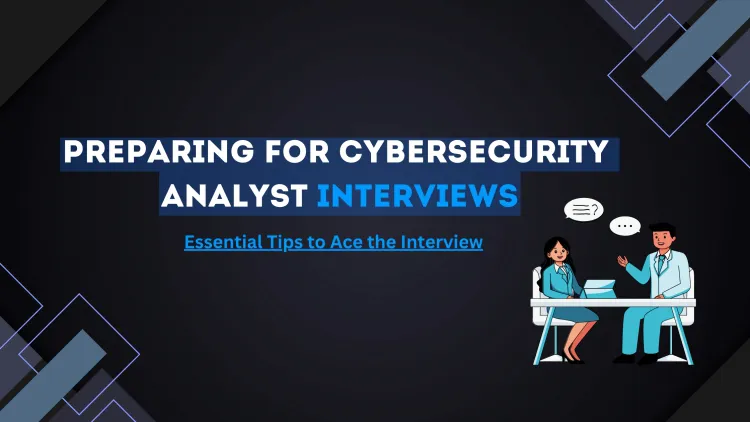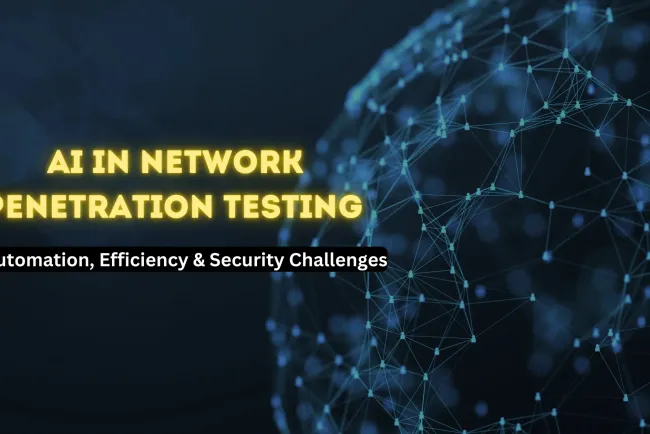Preparing for a Cybersecurity Analyst job interview requires a combination of technical knowledge, practical skills, and an understanding of how to communicate effectively with potential employers. This blog will guide you through the essential steps to prepare for interviews, including technical topics to study, common questions to expect, and tips to leave a lasting impression.
Understanding the Role of a Cybersecurity Analyst
Before diving into interview preparation, it’s crucial to understand what a Cybersecurity Analyst does. Their primary responsibilities include:
- Monitoring systems for security breaches.
- Conducting vulnerability assessments and penetration testing.
- Responding to incidents and mitigating threats.
- Implementing security measures to protect an organization’s assets.
Interviewers will expect you to demonstrate a strong grasp of these responsibilities, so ensure you can discuss them confidently.
Key Areas to Focus on for Interview Preparation
1. Technical Knowledge
A significant portion of the interview will test your technical skills. Focus on the following areas:
-
Networking Fundamentals:
Understand TCP/IP, DNS, HTTP, and protocols like HTTPS, FTP, and SSH. Be familiar with network topologies and firewall configurations.
-
Cybersecurity Tools:
Gain hands-on experience with tools like:
- Wireshark: For network traffic analysis.
- Nmap: For scanning networks and identifying vulnerabilities.
- Burp Suite: For web application security testing.
- Splunk: For SIEM and log analysis.
-
Operating Systems:
Know the basics of securing Windows, Linux, and macOS systems. Be familiar with user permissions, system architecture, and server configurations.
-
Threat Detection and Mitigation:
Understand malware analysis, threat modeling, and intrusion detection/prevention systems (IDS/IPS).
-
Security Frameworks and Compliance:
Study frameworks like NIST, ISO 27001, and CIS Controls. Be aware of regulations like GDPR, HIPAA, and PCI DSS.
2. Behavioral Questions
Many cybersecurity interviews include behavioral questions to assess how you handle pressure and work in a team. Be prepared to answer questions like:
- “Tell me about a time you identified and resolved a security issue.”
- “How do you handle conflicting priorities during an incident response?”
- “Describe a challenging project and how you overcame obstacles.”
Use the STAR method (Situation, Task, Action, Result) to structure your answers.
3. Common Cybersecurity Interview Questions
Here are some questions you should be ready to answer:
- What is the difference between symmetric and asymmetric encryption?
- How do you secure a network?
- What steps would you take during a security incident?
- What is the difference between vulnerability scanning and penetration testing?
- Explain how a firewall works.
- What is DNS spoofing, and how do you prevent it?
- Can you describe the CIA triad (Confidentiality, Integrity, Availability)?
Practice answering these questions clearly and concisely.
Tips for Success During the Interview
1. Research the Company
Understand the organization’s industry, security challenges, and technologies they use. Tailor your responses to show how your skills align with their needs.
2. Showcase Hands-On Experience
Highlight any labs, projects, or real-world scenarios where you’ve applied cybersecurity skills. For example, discuss your experience using tools like Metasploit or performing penetration tests.
3. Prepare for Problem-Solving Scenarios
Employers often ask situational questions, such as:
- “You notice unusual activity on a company server. What do you do?”
Walk them through your thought process step by step.
4. Demonstrate Communication Skills
Cybersecurity Analysts must communicate complex issues to non-technical stakeholders. Practice explaining technical concepts in simple terms, such as how a phishing attack works.
5. Highlight Certifications
If you hold certifications like CompTIA Security+, CEH, or CISSP, mention how these credentials have prepared you for the role.
6. Ask Thoughtful Questions
At the end of the interview, ask questions like:
- “What are the company’s biggest cybersecurity challenges?”
- “How does the security team collaborate with other departments?”
Post-Interview Steps
1. Send a Thank-You Note
Follow up with a thank-you email expressing appreciation for the opportunity and reiterating your interest in the role.
2. Reflect and Learn
Analyze your performance and identify areas for improvement. If you didn’t know the answer to a question, research it for future interviews.
Conclusion
Preparing for a Cybersecurity Analyst job interview requires a blend of technical expertise, practical experience, and strong communication skills. Focus on mastering tools, frameworks, and problem-solving strategies while practicing answers to technical and behavioral questions. By researching the company and showcasing your hands-on experience, you’ll increase your chances of landing the role.
Whether you're a beginner or an experienced professional, remember that interviews are as much about demonstrating your willingness to learn as they are about showcasing your skills. Good luck!
FAQs
-
What technical skills should I focus on for a Cybersecurity Analyst interview?
Focus on networking, operating systems, cybersecurity tools like Wireshark and Nmap, threat detection, and compliance frameworks like NIST and ISO 27001.
-
What are common technical questions asked in Cybersecurity Analyst interviews?
Questions may include topics like encryption, firewalls, incident response steps, vulnerability scanning vs. penetration testing, and DNS spoofing.
-
How can I prepare for behavioral questions during the interview?
Use the STAR method (Situation, Task, Action, Result) to structure your responses and practice answering questions about teamwork, problem-solving, and handling pressure.
-
What certifications can boost my chances in a cybersecurity interview?
Certifications like CompTIA Security+, CEH (Certified Ethical Hacker), and CISSP (Certified Information Systems Security Professional) are highly regarded.
-
How can I showcase my hands-on experience during the interview?
Discuss practical projects, labs, or real-world scenarios where you’ve applied cybersecurity tools and concepts.
-
What should I research about the company before the interview?
Learn about the company’s industry, security challenges, technologies, and recent cybersecurity incidents or projects.
-
How should I answer situational questions during the interview?
Walk the interviewer through your problem-solving process step by step, focusing on logical reasoning and practical solutions.
-
What communication skills are important for a Cybersecurity Analyst?
The ability to explain technical issues in simple terms, write detailed reports, and collaborate with non-technical stakeholders is essential.
-
What should I ask the interviewer at the end of the interview?
Ask thoughtful questions like, “What are the company’s biggest cybersecurity challenges?” or “How does the security team collaborate with other departments?”
-
What should I do after the interview?
Send a thank-you email, reflect on your performance, and research answers to any questions you couldn’t answer during the interview.












![Top 10 Ethical Hackers in the World [2025]](https://www.webasha.com/blog/uploads/images/202408/image_100x75_66c2f983c207b.webp)



![[2025] Top 100+ VAPT Interview Questions and Answers](https://www.webasha.com/blog/uploads/images/image_100x75_6512b1e4b64f7.jpg)







